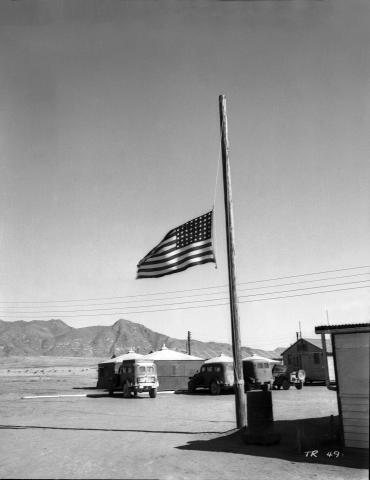On April 12, 1945—just as the Allies neared victory in Europe and as the war in the Pacific was reaching a bloody climax—the United States was shocked by the sudden death of its longest serving president: Franklin Delano Roosevelt. Later that day, Harry S Truman took the oath of office and became the 33rd President of the United States.
There was an air of uncertainty throughout the ranks of the Manhattan Project. It was Roosevelt who first authorized the bomb. He was instrumental in getting corporations, such as DuPont, to participate. No one knew for sure where Truman would take the project.
The death of Roosevelt affected the entire Manhattan Project community from the men in charge to young children with little understanding of the gravity of his death.
Thomas Jones was an intelligence officer at Los Alamos. He was with J. Robert Oppenheimer when Oppenheimer first heard the news. Jones remembered the encounter, “He had strong feelings about Roosevelt, I could sense that at once. He was ruminating about a previous encounter with Roosevelt at which he had been very struck by the man’s personality, which he had found magnetic. Oppenheimer had been very impressed, not just with the mind, but with the cordiality and thoughtfulness he had found in Roosevelt on that occasion.”
Oppenheimer scheduled a memorial service at Los Alamos the Sunday after Roosevelt died. He delivered a terse eulogy in which he proclaimed, “We have been living through years of great evil and great terror. Roosevelt has been our President, our Commander-in-Chief, and in an old and unperverted sense, our leader. We should dedicate ourselves to the hope that his good works will not have ended with his death.”
While it was unclear how Truman would handle the Manhattan Project, Oppenheimer remained optimistic. After the service, he said to David Hawkins, an administrative aide at Los Alamos, “Roosevelt was a great architect, perhaps Truman will be a good carpenter.”
The day Roosevelt died, General Leslie Groves was supposed to meet with Secretary of War Henry Stimson at Oak Ridge. Groves called Stimson’s special assistant, Harvey Bundy, to discuss the meeting plans in light of Roosevelt’s death. However, Bundy had not heard the news. Groves recalled this exchange:
I said this, and he says, “What do you mean?” I said, “I mean, the report that’s come in that the President has died.” Without a word—he didn’t say anything—but I heard this tremendous crash. I couldn’t tell what had happened. I didn’t know just what it could be. About thirty seconds later, he came on the phone again. He said, “General. I’m sorry. I just fell out of my chair.”
Groves had Bundy confirm the news with Stimson. Secretary Stimson was home that day. He was called to the White House and received confirmation the president was dead.
A Child’s Perspective
Captain William “Deak” Parsons’s young daughter, Peggy Bowditch, was home sick with the chicken pox when she heard on the radio that President Roosevelt had died. She told her mother, “Mother, Mother, I heard on the radio that Roosevelt had died.” Her mother responded, “Nonsense. You have a fever, you probably imagined it.”
Bowditch stayed home the next day as well. She later recalled, “I was absolutely infuriated when all the programming was about Roosevelt. No soap operas!”
For these interviews and more reflections on President Roosevelt, visit “Voices of the Manhattan Project.”





